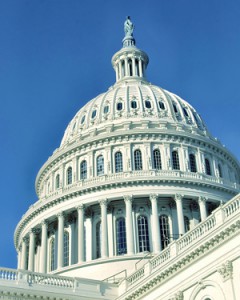On the Hill: It’s a Happy New Year for the Religious Right in Congress

2015 is underway, which means that a new, Republican-dominated Congress has just been sworn in. The House of Representatives, already firmly in the hands of Republicans before the midterm election, has added more conservative members while the Senate, previously led by Democrats, has switched over to Republican control. This power shift leaves many humanists and progressives wondering what kinds of legislation will be introduced in the coming months, and whether or not they should be concerned. The answer, unfortunately, is that there is much to worry about in this new Congress dominated by the religious right.
Voucher bills have always concerned the humanist community, not only because they weaken an already overstretched public education system, but because they would end up funding private religious education and supporting institutions that can discriminate against students and teachers in ways that public schools are prevented from doing. Two of the biggest vouchers bills, the Scholarship for Kids Act (introduced by Senator Lamar Alexander, R-TN) and the CHOICE Act (introduced by Senator Tim Scott, R-SC) could very well be passed in full or as part of a larger bill in the coming year. Alexander is now the chairman of the Senate Education committee, which gives him enormous control over federal education policy (and would allow him to move his Scholarship for Kids Act through the education committee without significant opposition). Scott meanwhile has introduced a resolution honoring School Choice Week, which may just be the first part of a strategy to reintroduce the CHOICE Act and work towards its passage. It’s likely that these bills, or a new bill very similar to them, will at the very least see some committee and/or floor action even if they eventually fail to pass the Senate.
Religious exemptions made up a big part of the last session of Congress, as the religious right tried hard to equate their “religious liberty” concerns with a right for some Americans to ignore certain laws or act in a discriminatory manner. The Equitable Access to Care and Health Act, which passed the House but failed to clear the Senate, is a good example of this trend, as it would have allowed Americans with “sincerely held religious beliefs” to be exempt from the individual mandate provision of the Affordable Care Act. The Military Religious Freedom Act is another similar piece of legislation, as it grants an exemption to military chaplains with religious objections to same-sex marriage from the requirement to perform marriage ceremonies for service members. Even the Employment Non-Discrimination Act, which the American Humanist Association supports and would prevent employment discrimination against Americans based on sexual orientation or gender identity, contained a religious exemption for certain religiously affiliated businesses.
It wouldn’t be a religious right-dominated Congress without a few anti-science bills making their way to the floor. Republicans, who largely supported an effort last year to cut and shift around a large chunk of funding for scientific research, are likely to introduce similar measures designed to save money at the expense of much needed research. And now that the infamous climate change denier, Senator Jim Inhofe (R-OK), leads the Senate committee that deals with the environment, we can expect a wide variety of anti-climate and anti-science bills to make the rounds. We also might see the reappearance of legislation that funds abstinence-only education, which has largely been defunded over the past few years in favor of medically accurate comprehensive sex education.
The 114th Congress might be more productive than the famously gridlocked 113th, but that isn’t necessarily a good thing. With control of important committees being given to religious ideologues, and with an ever-shrinking progressive minority, the humanist community can expect to see several pieces of legislation that makes our blood boil.
